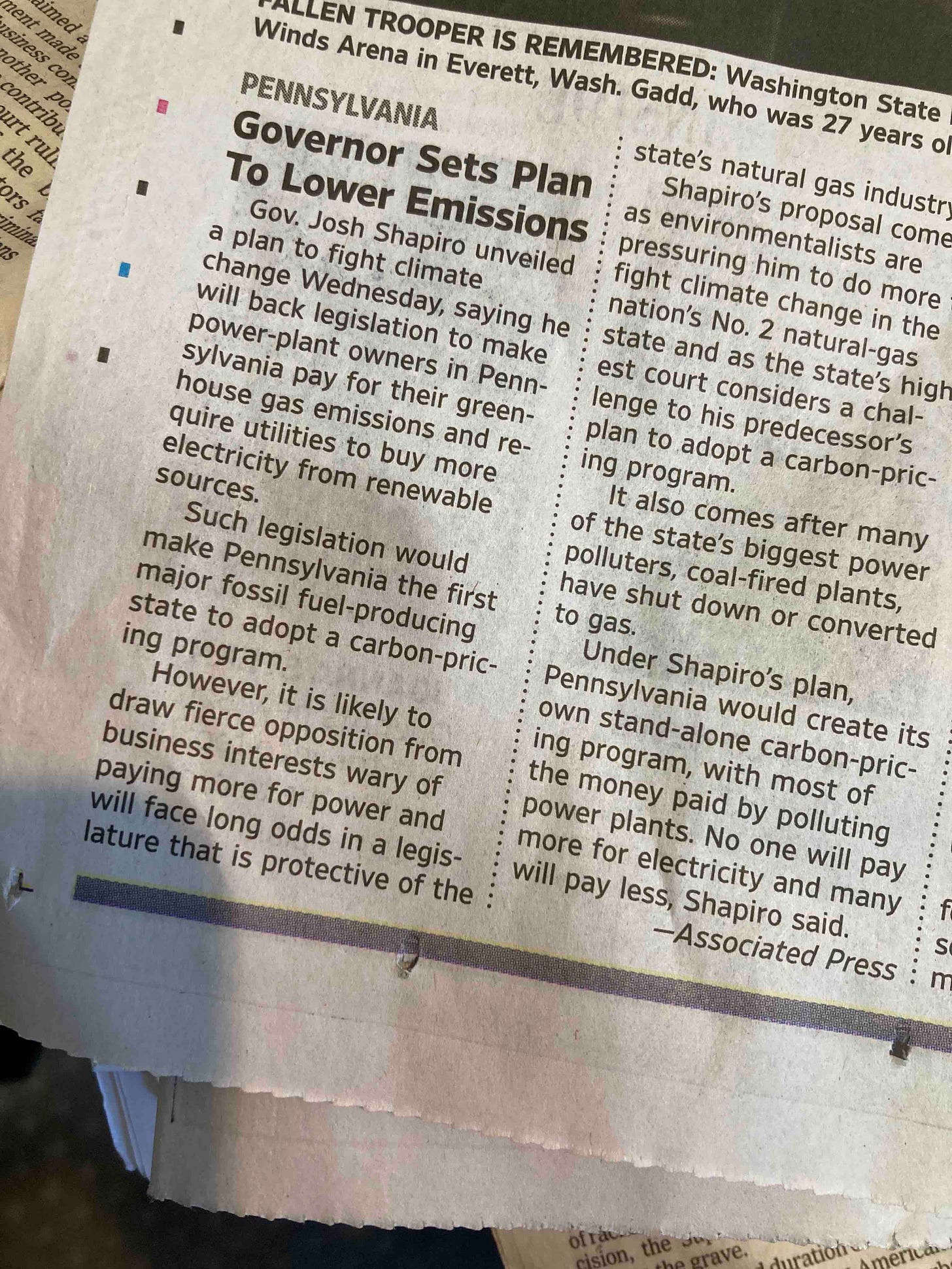Pennsylvania Proposes a Carbon Tax
Plus, Schumer throws Israel under the bus; TikTok and Senator Cotton’s “racist discourse”
One of the unfortunate consequences of the collapse of the press that I wrote about earlier this week (“The Last Los Angeles Times Press Run”) is that instead of covering newsworthy developments with their own reporters and skeptical, independent editing, even the best and biggest of our newspapers now sometimes rely on wire-service accounts that act as propaganda for politicians.
Page A2 of this morning’s Wall Street Journal carries an Associated Press dispatch headlined “Governor Sets Plan to Lower Emissions.” It begins, “Gov. Josh Shapiro unveiled a plan to fight climate change Wednesday.” The word “tax” doesn’t appear anywhere in the six-paragraph article. Instead the article claims, “Under Shapiro’s plan, Pennsylvania would create its own stand-alone carbon-pricing program, with most of the money paid by polluting power plants. No one will pay more for electricity and many will pay less, Shapiro said.”
Compare that to a March 13 press release from the Commonwealth Foundation, a free-market-oriented, Pennsylvania-based research group. “Governor Shapiro’s Disastrous Carbon Tax Hurts Families, Breaks Promises,” the release’s headline says. “Shapiro is actively breaking his campaign promises to avoid tax increases.” The release goes on:
The governor is already attempting to unilaterally impose the Regional Greenhouse Gas Initiative [RGGI]—a program that would strip nearly $800 million from the private sector while raising electric bills by as much as 30 percent for households and businesses. Now, Shapiro wants to double down with an economy-wide carbon tax that will drive up costs on everything from groceries to gasoline.
“It’s a one-two punch of higher taxes that working families can ill afford as they struggle with battering inflation and soaring prices at the pump. Shapiro appears hellbent on making energy more expensive to appease his radical environmentalist base and pay homage to his progressive campaign donors instead of looking out for the best interests of taxpayers.
“Shapiro wants to turn Pennsylvania into the next California. He’s implementing the same economically destructive climate policies that have crippled the Golden State and caused gas at the pump to become practically a luxury good. His decision is economically backward for our commonwealth—and it’s a mistake we can’t afford.
Shapiro’s own press release euphemistically describes his plan as “generating $5.1 billion in investment in clean, reliable energy sources,” of which “70% of the revenue will be directed back to Pennsylvania residents as a rebate on their electric bill,” while the rest “will support projects…”
This $5.1 billion in “investment” isn’t going to magically appear from nowhere, and the “support projects” is a fancy way of saying “government spending.” The claim that the money will be “paid by polluting power plants,” is comical. “Power plants” don’t pay money; the shareholders of the companies that own them do, and the shareholders sometimes pass along the costs by charging customers more or paying workers less.
I’m not suggesting climate change isn’t worth trying to slow or counteract, or that protecting the environment and fighting pollution shouldn’t be priorities for politicians or public policy. But such policies, no matter how much they try to be win-win, inevitably involve tradeoffs, especially if taxes are involved. So it doesn’t do the public any favors to obscure the fact that taxes are involved, especially $5 billion in taxes. There are some Republicans who think some sort of revenue-neutral carbon tax, offset by a cut in payroll taxes or income taxes, would be good idea, because it would lead to a market-based solution to environmental problems as opposed to a top-down, central-planning, command-and-control, regulatory solution. But even those Republicans are usually straightforward about calling it a tax rather than a “plan to lower emissions.”
Beyond the press-criticism point, there’s a political point. Shapiro has earned some positive national press attention—some people are even mentioning him as a potential Biden replacement on the 2024 Democratic ticket—by making gestures in the direction of common-sense centrism on issues such as school choice (though there he folded) and cracking down on campus antisemitism. A $5 billion election-year tax increase on the energy industry in a year that consumers are already feeling inflation pain in energy prices—to appease suburban college-educated voters concerned about climate change—seems like more of a political loser. Perhaps Shapiro figures that if the press calls it a “plan to lower emissions” rather than a tax increase, he won’t pay any political price.
Schumer throws Israel under the bus: The Democratic leader in the Senate, Charles Schumer, who had been admirably strong in the immediate aftermath of the October 7 terrorist attack, has shifted course.
On March 14 he delivered a speech on the Senate floor in which he described both Hamas and Netanyahu as "obstacles to peace." He warned Israel is becoming, "a pariah opposed by the rest of the world." He called for “genuine statehood for the Palestinian people.”
Elliott Abrams, himself a former staffer to a Democratic Senator staffer from New York, Daniel Patrick Moynihan, had an admirably rapid and direct reply up at his Council on Foreign Relations blog, Pressure Points. Abrams called Schumer’s “rant” an “attack on a democratically elected government, unprecedented and indefensible especially in the middle of a war.”
Abrams called it “a shameful and unprecedented way to treat an ally, and an unconscionable interference in the internal politics of another democracy.”
The Republican leader, Senator Mitch McConnell, had a strong comeback as well: “The primary ‘obstacles to peace’ in Israel’s region are genocidal terrorists like Hamas and Palestinian Islamic Jihad who slaughter innocent people and corrupt leaders of the Palestinian Authority who have repeatedly rejected peace deals from multiple Israeli governments. And foreign observers who cannot keep these clear distinctions straight ought to refrain from weighing in. It is grotesque and hypocritical for Americans who hyperventilate about foreign interference in our own democracy to call for the removal of the democratically elected leader of Israel.”
TikTok and “racist discourse”: One of the silliest news articles of the past few months was a front-page New York Times news article with the headline, “Republicans Take After Trump With Bigoted Attacks on Foes.” The reporter on it, Annie Karni, used to work for me and is a very enterprising, smart, and hardworking reporter and a nice person on top of all that, but the piece itself was very strange. From the Times article:
At a hearing across the Capitol, Senator Tom Cotton, Republican of Arkansas, grilled the chief executive of TikTok, Shou Chew, about his nation of origin. Mr. Cotton repeatedly demanded to know whether Mr. Chew — who is from Singapore and of Chinese descent — was Chinese, held a Chinese passport or was a member of the Chinese Communist Party.
“No, senator — again, I’m Singaporean,” Mr. Chew responded with agitation after saying several times that he was not Chinese….
The racist discourse by Republican members of Congress, both in casual comments and in official statements, has become so commonplace that it now often slips by without any real condemnation from the G.O.P.
Until Trump came along the Times had been more cautious about slapping the “racist” or “bigoted” label on mainstream politicians.
The front page of today’s New York Times, meanwhile, reports—in a three byline piece that includes Karni as an author—on a 352-65 House vote in favor of “a bill with broad bipartisan support that would force TikTok’s Chinese owner to either sell the hugely popular video app or have it banned in the United States.” The action, the Times said, came “amid the Biden administration’s push to persuade lawmakers that Chinese ownership of the platform poses grave national security risks to the United States, including the ability to meddle in elections.”
The Times went on, “The administration has repeatedly sent national security officials to Capitol Hill to privately make the case for the legislation and offer dire warnings on the risks of TikTok’s current ownership. The White House briefed lawmakers before the 50 to 0 committee vote last week that advanced the bill to the full House. On Tuesday, officials from the Federal Bureau of Investigation, the Office of the Director of National Intelligence and the Justice Department spoke with lawmakers in a classified briefing about national security concerns tied to TikTok.”
It seems to me that the Times owes Senator Cotton an apology for describing his questions as “bigoted” and “racist,” or else it should apply the same description to Biden and the many Democrats who voted for the bill. Otherwise, it looks as if the Times just has an ax to grind against Cotton, whose opinion column for the paper was too much for its staff and management to handle. There may be racist and bigoted Republicans and there may be racist and bigoted Republican rhetoric, but a senator asking the CEO of TikTok about Chinese Communist influence doesn’t deserve to be smeared as racist and bigoted in the voice of the Times’ own news columns.
A Bloomberg non-exclusive: Bloomberg slapped an “exclusive” label on its March 13 story headlined “Trump Has Raised Billionaire John Paulson as Potential Treasury Pick.”
I wrote that January 23: “John Paulson at Trump II Treasury?” “Read it here first,” as we like to say.
Thank you!!: Thank you so much to the hundreds of you who have subscribed and who have become paying members and readers. Your support makes this possible. I am grateful to you. If you appreciate what we are doing, please help us grow by sharing this with a friend along with a suggestion that they sign up, too.




